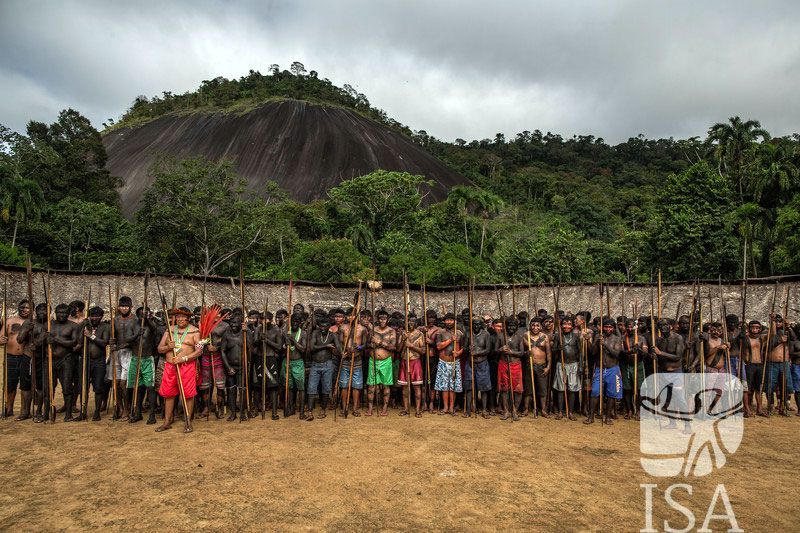
FOR IMMEDIATE RELEASE
June 30, 2020
MEDIA CONTACTS
Maryka Paquette: [email protected] or +1 (619) 517-4126
Camila Rossi: [email protected] or +55 11 98152 8476
Instituto Socioambiental (ISA): [email protected]
Survival International: [email protected] or +44 (0) 7841 029 289
The Indigenous Hutukara Yanomami Association demands a rigorous investigation of the murders and reinforces the need for the Brazilian government to immediately expel more than 20,000 miners illegally operating on Yanomami land.
Roraima, Brazil – In a statement denouncing the murder of two Yanomami people by armed illegal gold miners on protected Indigenous territory, the Hutukara Yanomami Association raised fears that land invaders are driving a disastrous cycle that echos past genocidal violence.
According to an anonymous Yanomami witness during the first half of June, in the vicinity of Xaruna community in the Brazilian state of Roraima, a group of Yanomami visited an illegal mining camp to request food. Having received less food than requested, the witness claims they complained to the miners, who then pursued the group with firearms and murdered two of them.
“The murder of two more Yanomami by miners must be rigorously investigated and reinforces the need for the Brazilian State to act urgently and immediately remove all the miners who are illegally exploiting the Yanomami Territory and harassing and assaulting the indigenous communities who live there. We call on the authorities to take all necessary measures to stop the mining which continues taking Yanomami lives,” says the Hutukara statement. “We fear that the families of the murdered Yanomami will decide to retaliate against the miners, following the Yanomami culture’s system of justice, which could lead to a cycle of violence that will result in a tragedy.”
For decades, the Yanomami have resisted the invasion of illegal miners on their lands, but conflicts between communities and illegal gold miners remain frequent. It is estimated that more than 20,000 illegal miners currently operate within Yanomami Indigenous Territory.
Under the Bolsonaro government’s ongoing encouragement of Indigenous land invasions, the number of miners in the region has dramatically increased and native communities fear for their safety. This month’s murders are not an isolated problem and are likely to recur in other areas affected by illegal mining on Yanomami lands.
The Hutukara statement notes that a similar situation resulted in the Haximu massacre in 1993, when 16 Yanomami from the community of Haximu were murdered by miners, in the first case of genocide recognized by the Brazilian state. Twenty-seven years after the massacre, the Yanomami once again face widespread invasions of their lands.
The Yanomami witness account describes a cyclical, fraught relationship between the Yanomami and miners ever since the Indigenous territory suffered invasions of more than 40,000 wildcat miners in the 1980s. At first, miners arrive in small numbers in a community’s territory and seek friendly relations with the Yanomami, offering food and goods from the city. As the number of miners increases and their settlement becomes permanent, they feel at ease in the territory and come to regard the Yanomami as a nuisance. The Yanomami’s requests for merchandise from the city are ignored and relations become tense.
With the advance of the COVID-19 pandemic, the Yanomami and Ye’kwana Leadership Forum launched the #MinersOutCovidOut campaign, which has already collected 300,000 signatures for the immediate withdrawal of illegal miners from the Yanomami Territory. On June 16, Hutukara and the National Human Rights Council filed a request for precautionary measures with the Inter-American Commission on Human Rights (IACHR). The measure is intended to ensure that the Brazilian government takes concrete measures to protect the Yanomami.
The campaign is supported by the Association of Brazil’s Indigenous Peoples (APIB), the Coordination of Indigenous Organizations of the Brazilian Amazon (COIAB), the Instituto Socioambiental (ISA), Survival International, Greenpeace Brazil, Conectas Human Rights, Amnesty International Brazil, Amazon Cooperation Network (RCA), Igarapé Institute, Rainforest Foundation US, Rainforest Foundation Norway, and Amazon Watch.
Rainforest Foundation US was founded 30 years ago to promote the rights of indigenous peoples living in the rainforest and to support them and other forest communities in their effort to protect and defend their territories.








